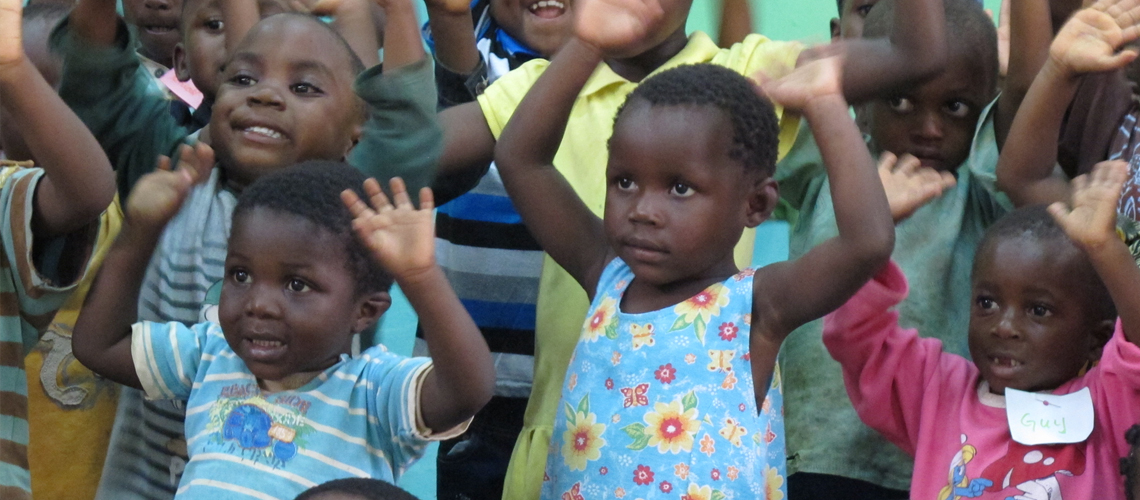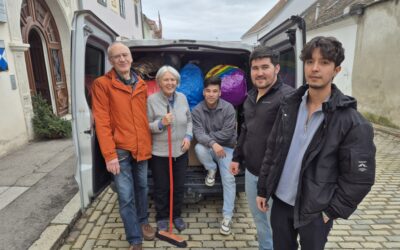Sonia is from Slovacchia; she’s five and goes to nursery school. One day she told her mom that she had found a friend in school. “And what’s her name?” “I don’t know, she doesn’t speak. I approached her since I saw she was always alone and nobody wanted to play with her.” Sonia’s mom usually fetches her for lunch. But the teacher said: “Let her stay! She helps us with a gypsy girl who at first did not speak at all and now, thanks to her, has started to talk and cooperate with the others.” When she returned home her mother asked: “Did your friend say something to you?” “No, but she smiles when I tell her I like her.” Her mother remained silent. And the child said: “You know, love warms up each one of us.”  From Cameroon Kevin wrote: «One day in school during the break I asked one of my schoolmates if he had anything to eat. I was hungry and had nothing. He refused. The day after, I brought a piece of bread and when he came to ask me, I in turn refused. The next day, upon throwing the love dice it said: “Love your enemies.” I thought of that classmate. In school I tried to speak to him but he didn’t answer. So I sat in front of the house, waiting for him and when he came by, I called out to him, went up to him and when I asked why I shouldn’t speak to him anymore, he answered: “You refused to share with me the bread you had.” I immediately said, “Let’s make up!”and handed him some guava fruit I had with me. And so we started to talk and became friends again.»
From Cameroon Kevin wrote: «One day in school during the break I asked one of my schoolmates if he had anything to eat. I was hungry and had nothing. He refused. The day after, I brought a piece of bread and when he came to ask me, I in turn refused. The next day, upon throwing the love dice it said: “Love your enemies.” I thought of that classmate. In school I tried to speak to him but he didn’t answer. So I sat in front of the house, waiting for him and when he came by, I called out to him, went up to him and when I asked why I shouldn’t speak to him anymore, he answered: “You refused to share with me the bread you had.” I immediately said, “Let’s make up!”and handed him some guava fruit I had with me. And so we started to talk and became friends again.»  From Italy, Marco recounts: «One day at the nursery, the children made fun of me because I’m fat. I was sorry they did that and sometimes I cried. So I went to the Nun and instead of accusing them I told her of my sufferings. I understood that I had to forgive them and did so, because a Gen4 is one who, like Jesus, forgives and loves all.» Carmen lives in a slum at the outskirts of Mexico City. Often in the evening her uncles returns home drunk. Carmen is scared and hides herself. «But the other evening I didn’t hide – she says – I waited for him and helped him enter. I wasn’t scared because I knew that Our Lady takes care of me.» E Bartek, from Poland: «At the children’s party I received a gift from Teacher Ela, a chocolate bar and a lollipop. In my class there a girl called Asia, whom nobody likes. I remembered that in the morning upon throwing the dice, it said: “Love your enemies” and so I gave Asia the lollipop and half of the chocolate. She was surprised and thanked me, and then left. Now we have become big friends.» «In the centre of Naples (Italy), the “Baby Jesus” we make and offer to people is really selling quickly and many gather around the stand if only to say that they wish to join the initiative. A teacher, an agnostic, who has many problems, held Baby Jesus in her hands and looked at it: “This will be my Christmas!” A child ran home, emptied out his piggy bank and came with all his coins to buy his own Baby Jesus.» By the Gen4 Centres
From Italy, Marco recounts: «One day at the nursery, the children made fun of me because I’m fat. I was sorry they did that and sometimes I cried. So I went to the Nun and instead of accusing them I told her of my sufferings. I understood that I had to forgive them and did so, because a Gen4 is one who, like Jesus, forgives and loves all.» Carmen lives in a slum at the outskirts of Mexico City. Often in the evening her uncles returns home drunk. Carmen is scared and hides herself. «But the other evening I didn’t hide – she says – I waited for him and helped him enter. I wasn’t scared because I knew that Our Lady takes care of me.» E Bartek, from Poland: «At the children’s party I received a gift from Teacher Ela, a chocolate bar and a lollipop. In my class there a girl called Asia, whom nobody likes. I remembered that in the morning upon throwing the dice, it said: “Love your enemies” and so I gave Asia the lollipop and half of the chocolate. She was surprised and thanked me, and then left. Now we have become big friends.» «In the centre of Naples (Italy), the “Baby Jesus” we make and offer to people is really selling quickly and many gather around the stand if only to say that they wish to join the initiative. A teacher, an agnostic, who has many problems, held Baby Jesus in her hands and looked at it: “This will be my Christmas!” A child ran home, emptied out his piggy bank and came with all his coins to buy his own Baby Jesus.» By the Gen4 Centres
Cast your cares on God!
Cast your cares on God!




0 Comments